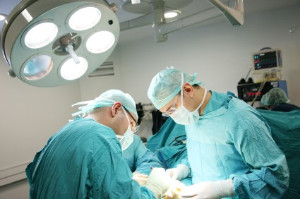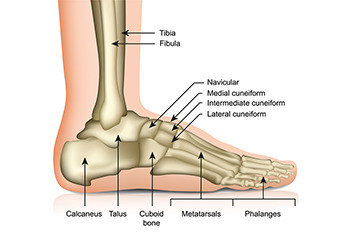Connect With Us
Blog

Balance and mobility in older adults are strongly influenced by foot and ankle health. Key factors include ankle flexibility, the ability to sense touch on the soles, and the strength of toe muscles used to push down. These aspects are critical for steady movement and overall functional ability. When these characteristics decline, it can lead to impaired balance and increase the risk of falls. Strengthening exercises for the feet stretches to improve ankle flexibility, and strategies to enhance sensation in the soles, like using textured insoles, can help improve stability and movement. Such interventions not only boost confidence in mobility but also lower the chance of injury from falls. If you are a senior and balance issues or foot discomfort arise, it is suggested that you consult a podiatrist for a proper diagnosis and treatment.
If you need your feet checked, contact Vivian C. Iwu, DPM of Choice Podiatry Center. Our doctor will attend to all of your foot and ankle needs and provide you with quality treatment.
Geriatrics and Podiatry
When people age, some common issues that may occur are bone density loss, dry skin, poor circulation, and rough brittle nails. These issues may also affect your foot health if the necessary steps are not taken to alleviate the problems.
It is important to take care of your feet because feet that are injured or diseased can affect your overall health. Having painful feet hinders your ability to do daily activities or may decrease your willingness to do the things that you need to do.
Visiting Your Geriatrician
As we age, health problems become more likely, so it is essential to visit your doctor for check-ups to ensure that you are doing the best you can to take care of your health. It is recommended to check your feet frequently for any possible cuts, bruises, swelling, corns or any other irregularities.
Taking Care of Elderly Feet
Cracked or dry feet can be treated by applying moisturizer often. It is also important not to wear old socks because the older the sock is, the higher the possibility there will be that there is bacteria there. Wear fresh socks and make sure they fit properly.
Proper foot health means that you can have a more active lifestyle and you will not be bogged down by pain. Foot health also leads to good circulation, which is paramount for overall health.
If you have any questions, please feel free to contact our office located in Marietta, GA . We offer the newest diagnostic tools and technology to treat your foot and ankle needs.

Ankle replacement surgery, also known as total ankle arthroplasty, is a procedure used to treat severe ankle arthritis or joint damage. The surgery involves removing the damaged parts of the ankle joint and replacing them with artificial components, typically made of metal and plastic. The primary causes of ankle arthritis that lead to the need for replacement include wear and tear from aging, previous ankle fractures, or inflammatory conditions like rheumatoid arthritis. Symptoms such as chronic pain, stiffness, and swelling in the ankle, along with difficulty walking, are common indicators for considering this surgery. Ankle replacement surgery can help relieve pain, improve mobility, and restore function, allowing patients to return to daily activities. If you have chronic ankle pain, it is suggested that you are under the care of a podiatrist who can determine if ankle replacement surgery is right for you.
In certain cases, in which the patient suffers from extreme pain or damage in a joint, joint replacement surgery may be deemed useful. If you have constant pain in a foot joint, consult with Vivian C. Iwu, DPM from Choice Podiatry Center. Our doctor will assess your condition and provide you with quality foot and ankle treatment.
What Is Joint Replacement Surgery?
Over time, joints wear down; this can be exacerbated by diseases and conditions. Joint replacement surgery, also known as arthroplasty, is when a damaged joint is surgically removed and replaced with a prosthesis. Prostheses, which can be made of ceramic, plastic, or metal, act as joints in lieu of an actual joint. One of the most prevalent causes for joint replacement is arthritis.
Arthritis in the Foot
Arthritis can occur in any joint in the body, including in the feet. Common types of arthritis in the foot are osteoarthritis, rheumatoid arthritis, and gout. The big toe is usually where arthritis occurs in the foot; this is known as hallux rigidus.
Joint Replacement Surgery in the Foot
The most common form of joint replacement in the foot is a first metatarsophalangeal (MTP) joint placement. MTP joint replacement surgery is designed to treat hallux rigidus. Surgery is not intensive, and recovery occurs within one to two months after the procedure has been done. Overall, joint replacement surgery is a safe and effective way to treat pain in the joint of the foot.
If you have any questions, please feel free to contact our office located in Marietta, GA . We offer the newest diagnostic and treatment technologies for all your foot care needs.

The 5th metatarsal is the bone on the outer edge of the foot that connects the midfoot to the base of the pinky toe. One common injury to the 5th metatarsal is an avulsion fracture, where a tendon pulls off a small piece of bone from its base. It is also known as a pseudo-Jones fracture. This is often caused by a sudden inward roll of the foot during activities like sports or stepping awkwardly. Symptoms of an avulsion fracture include pain, swelling, and bruising on the outside of the foot, and walking may be difficult. A pseudo-Jones fracture is sometimes confused with Jones fractures, which involve a break in the shaft of the fifth metatarsal bone. These two fractures require different treatments. A pseudo-Jones fracture often heals with a walking boot or cast, while Jones fractures may require surgery. A podiatrist can identify the type of fracture through an exam and X-rays in order to recommend the best treatment. If you have injured your 5th metatarsal, it is suggested that you make an appointment with a podiatrist for the appropriate care.
A broken foot requires immediate medical attention and treatment. If you need your feet checked, contact Vivian C. Iwu, DPM from Choice Podiatry Center. Our doctor can provide the care you need to keep you pain-free and on your feet.
Broken Foot Causes, Symptoms, and Treatment
A broken foot is caused by one of the bones in the foot typically breaking when bended, crushed, or stretched beyond its natural capabilities. Usually the location of the fracture indicates how the break occurred, whether it was through an object, fall, or any other type of injury.
Common Symptoms of Broken Feet:
- Bruising
- Pain
- Redness
- Swelling
- Blue in color
- Numbness
- Cold
- Misshapen
- Cuts
- Deformities
Those that suspect they have a broken foot shoot seek urgent medical attention where a medical professional could diagnose the severity.
Treatment for broken bones varies depending on the cause, severity and location. Some will require the use of splints, casts or crutches while others could even involve surgery to repair the broken bones. Personal care includes the use of ice and keeping the foot stabilized and elevated.
If you have any questions please feel free to contact our office located in Marietta, GA . We offer the newest diagnostic and treatment technologies for all your foot and ankle needs.


